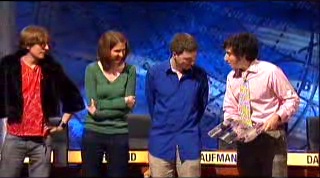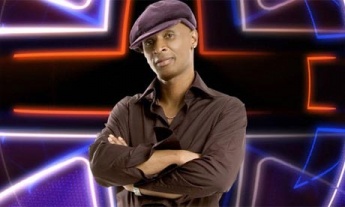Weaver's Week 2008-03-09
UKGameshows (Talk | contribs) |
m (1 revision) |
Current revision as of 13:57, 22 December 2009
Contents |
University Challenge
The Grand Final: Christ Church Oxford v Sheffield
Two hundred teams sat the paper, 28 appeared on the screens, two remain. Christ Church Oxford have knocked out the last two champions, Warwick and Manchester. Sheffield rather crept up on us, but they knocked out a very good Exeter side in the quarters and double-winners Magdalen Oxford in the semi. Eyes down, here we go.
As has become traditional this year, the show opens with a definition: this show, it's "S". The first set of bonuses, rather appropriately, is on answers or lack of them. And a tip of the hat to the question-writers for this one:
- Q: What 28-letter word, with two prefixes and three suffixes...
- Phil Smith, Sheffield: Antidisestablishmentarianism.
Which we're relieved to find is in our spell-checker's dictionary. "You may answer in Greek or English", says Thumper about one of the resultant bonuses. The joke that 31 in base 8 (or octal) is equal to 25 in base 10 (decimal) is only slightly spoiled when we're told that OCT is October. Christ Church has rather run away with things, including a set of bonuses lifted from the BBC Style Guide. The first visual round is on Italian States Circa 1795, and Christ Church has raced to a 105-10 lead.
Sheffield pulls back by guessing this week's second letter (Q), and picking up their first bonus of the night. No-one knows any elements ending in -UM but not -IUM, but everyone remembers Ségolène Royal, even if the subtitlers don't remember her accents. What? They can't do accents on subtitles? Fair enough. The number of "p"s in the first eight words of "Peter Piper..." eludes both sides, but Sheffield is slowly mounting a comeback, three starters without any correct answers from Oxford briefly cuts the gap to 35. The audio round is another excuse for Aditya Balachander to Name That Baroque Composer in two notes: the Sheffield star knows his Handel, and Christ Church's lead is down to 110-75.
"Your bonuses are on punctuation in computer programming", says Thumper to groans. The first year AD to contain all Roman letters? MCDXLIV, or 1444. Sheffield get the next two starters, and a game that was looking like a whitewash ten minutes ago could yet turn into a cliffhanger, Christ Church's lead is down to five points, but a starter on the etymology of "pedigree" gives them some breathing space, and recent Stewards of the Chiltern Hundreds some more. Too soon to be running down the clock, and it's good to see that they're playing as quickly as they dare. The second visual round is Name That Pollocks: it's abstract expressionist art, rather good for making sure your television set is correctly tuned in. Christ Church has eked out a lead of 160-115.
It grows with the next starter, and – once more – every member of the Christ Church side has answered at least one starter correctly. They pull further ahead by remembering some Liberal prime ministers of Canada in recent years, and that 80-point lead is looking impregnable. The Oxford side gets a stinker of bonuses concerning multiples of metric prefixes; we don't understand it and we've got the answers in front of us! Sheffield get a starter about Pope Leos, but it's not going to close the gap of more than 100 points.
Sheffield gets a couple of starters in the closing moments, but it's not going to be enough. Christ Church Oxford wins by 220-170. For the record, Max Kaufman led for Christ Church, six starters as the side made 18/42 bonuses with two missignals. Five starters for Aditya Balachander, the Sheffield team managed 15/30 bonuses with a single missignal.
The prize is presented by Joan Bakewell, who proclaims the huge amount of knowledge that the teams possess.
Next matches: The University Challenge Boat Race, Cambridge v Oxford, 29 March.
The University Challenge Dragon Boat Race, Manchester v Salford, 10 May.
Eurovision: Your Decision
BBC-1 and BBC-HD, 6.59 and 9.29, 1 March
We're back to London for this year's event. There's a new co-host, Claudia Winkleman has replaced Fearne Cotton, as the latter has decided to emigrate. And there's a new format: the decision of who shall represent the UK will be made, in part, by Mr. Terry Wogan. He's going to spend the evening on his throne, with supplicants Carrie Grant and John Barrowman. Mrs. Grant was rightly scathing about Jemini not knowing their own song; Mr. Barrowman was a critic on last year's Any Dream Will Do. He will be looking for entertainment, good singing, and something that "will be a good Eurovision song". The sentence is approximately one word too long: a good song at Eurovision is a good song, full stop. This year's contest has been divided into three head-to-head pairings. Barrowman and Grant will decide the winners of each pair, and they'll be joined in the public vote by Wogan's Wildcard, the least bad of the three losers.
First up are a pair of girl bands, and first to perform are Loveshy, performing "Mr Gorgeous" (songwriter not credited on screen. To save our keyboard, no songwriters will be credited on screen.) They're half of Clea, the band formed from four of the rejects from Popstars: The Rivals in 2002. The song takes the beat from Depeche Mode's late-80s classic "Personal Jesus", and marries it to some very dodgy vocals: Hey Mr Gorgeous, I'm having you for breakfast, lunch, and dinner. Sounds like a rallying call for Michael Heseltine. It's not clear whether the vocals were too far down in the mix, or the singers don't know how to use microphones, or some gremlins crept in, but this was not competent. There are chairs and blokes losing their shirts, and backing singers wrapped in cooking foil, but it ain't good.
The Revelations are the one act performing tonight who have yet to taste defeat on a television casting show. Their song is "It's you", and it's a very affectionate pastiche of the early-1960s girl-group sound. There are a few missed notes, and the effect is clearly inferior to the Pipettes, but the song has the germ of being utterly fabulous. However, we must remember how Precious had a great song in 1999, and botched the performance. It's no surprise to find that the Revelations progress 2-0.
The second pair is Casting Show Rejects, but before that, we'll take a whistle-stop tour of some of the disasters from previous A Song for Europe shows. At least, the ones hosted by Wogan and filmed in colour. First to perform in part two is Rob McVeigh, a finalist on Any Dream Will Do, singing "I owe it all to you". It's a brooding ballad, and in the hands of a female singer with big lungs would be great. Mr. McVeigh is a great singer, but this song is does not work with his talents.
He's up against Simona Armstrong, one of the runners-up from How Do You Solve a Problem Like Maria? She's playing up her roots from what is now Romania, and singing "Changes". It's the sort of soft-rock that would have been a shoo-in in the late 1980s, and still doesn't sound desperately dated. Two problems here: while Mrs. Armstrong would have done justice to Mr. McVeigh's song, she is underpowered for this one, which really needs someone with the lungs of Céline Dion or Marija Serifovic. The second problem is her costume: there's nothing much wrong with a bodice top, frilly skirt, generally looking like a traditional ballerina. Apart, that is, from the six-inch high heels. They mean that Mrs. Armstrong is unable to do more than clump and totter about the stage v-e-r-y slowly. There's no attempt at dancing, no way of conveying the energy of the song, and that's got to count against it.
What do the judges think? Barrowman is of the opinion that "I don't think a ballad is right for Eurovision", rather neglecting the fact that last year's winner was – a ballad! He's also raising the phantom of the non-existent "political voting", which has never decided the contest, and never will. "It's like we're doing a check-mate to their Czechs," he says, in a clear entry to the Jokes Falling Flat file. Grant reckons that Simona's bonkersness was right for Eurovision. We agree to the point that it was the right sort of bonkers, modulo a costume change and some choreography. The judges put Simona Armstrong through, and Wogan reckons that "they'll love it east of the Danube." What about the two-thirds of the votes from west of the Danube? If they like it in the east, they'll like it in the west.
Before the next performances, we're subjected to The Terrys, a run-through of Wogan's most xenophobic statements over his twenty-nine contests. Cor, look at these foreigners, don't they dress funny! Don't they look funny! At least they can sing in tune, and be entertaining. And their commentators keep quiet during the songs.
The final pair is Chart Stars. Andy Abrahams finished second on the 2005 series of The X Factor, and had a top-20 single a year later. He's performing "Even if", which begins as if it's going to be a copy of Sidney Youngblood's late-80s hit "If only I could", but then turns into a proper soul stormer, reminding us of "Everybody", the Tanel and Benson number from Estonia 2001. We also recall that song won. Here's the hint, people: Mr. Abrahams has the stage presence, knows how to bring the viewer along with him, and will give a tremendous performance. In terms of presentation, this reminded us of "Fly on the wings of love", a song that didn't cut it on record, but sounded like the 2000 winner from the first chord.
Michelle Gayle was part of late-80s rap duo Fresh 'n' Fly, and had a brief solo career in the mid-90s, peaking with the fabulous "Sweetness". Since then, she's been on Reborn in the USA, where she lost. Her song is "Woo (u make me)", and also ploughs the faux-Motown furrow. It has a hook the size of a crane, and though it's an entirely vacuous song, that's what some people will be voting for. The crowd goes wild over Ms. Gayle, and she's got the support of Barrowman and Grant. "It's Eurovision, Eurovision, Eurovision," claims Barrowman, helpfully reminding us that we're not watching the Reality Show Losers Show.
Michelle Gayle goes through to the public vote, but Andy Abrahams joins her on Wogan's Wildcard. The four contenders are then up for the public vote; lines are open for an hour and ten minutes, then close. There's no SMS voting, everything is done by 0898 number. Our thoughts: Revelations risks crashing and burning, Simona and Andy would be good choices, Michelle a safe choice that might come back and bite us. And could it be that the four were pre-destined all along, the other two were just along to boost their careers a little?
In the second programme, we find out that the top two is Andy Abrahams and Michelle Gayle. They perform again, during which Mr. Abrahams nails it and Ms. Gayle looks alarmingly like a chicken, and there's further comment from the judges; they're backing Ms. Gayle, the studio audience is backing Ms. Gayle. We're watching the show back in the cold light of the next day, and reckon her song sounds better when compressed to double speed, and bears a remarkable resemblance to "Hey ya", Outkast's monster hit from a few years back. At double speed, Mr. Abrahams' song just sounds wrong.
Inevitably, there's some filler: Wogan presents pictures of some of the other competitors, including a very buxom brunette from Slovenia, Mr. the Turkey from Ireland, and some strippers from Estonia. There's a performance by Katrina Sans the Waves, and a chat with friends and family of the finalists. Regrettably, there's also another burst of Wogan's Xenophobia. Aren't there laws against this kind of thing?
In the event, we have a winner. It's not going to please the judges, and leads to the loser slinking off-stage without saying good-bye or congratulating the winner. Heading to Belgrade: Andy Abrahams. The show ends during the middle of the reprise, just so that the football can start on time. The recent UK entries haven't left Mr. Abrahams much of a hurdle to beat, and we suggest that 50 points and 15th place (or second-best of the Big 4) is the very least he should aim for. It would be difficult to hear Andy's song winning, but mid-table respectability could be within his grasp.
Is this really the limit of the BBC's ambitions? How has the UK managed to find itself so completely marginalised from contemporary European thinking? None of these songs were in any way typical of the contemporary domestic music scene. None of these singers has met with significant commercial or critical success in the past decade. Mr. Barrowman is such a fan of Eurovision that he's forgotten last year's winner already – some of us have been singing it every week since. Mr. Wogan's small-minded foreigner-bashing depressed us yet again, and our plan remains to do some digital jiggery-pokery to delay the RTE radio commentary so that it matches with the visuals.
If the BBC wants a decent result, it needs to stare down the blatant xenophobia of its cherished commentator. We've said in the past that the Eurovision Song Contest is a chance for Europe to get together and find the song that annoys the British commentator the most. Putting him in charge of the national selection feels like a recipe for disaster.
And, if Mr. Abrahams returns from Belgrade with the winner's trophy, we will eat lashings of humble pie.
Mastermind
Second Round 4/6
First into the fray is Les Morrell, who will be taking Upstairs Downstairs. This was a light comedy about the life of an Edwardian society family and their servants. We understand that the questions from this round have been republished on a fan site, so will note only that the score you have to beat is 15 (2).
Hamish Cameron will tell us about Allesandro Botticelli, an artist from Florence. He is not to be confused with the food poisoning. We've not found these questions online, and politely suggest that 16 (1) is a very tough score to beat.
Stewart Cross discusses Steeleye Span, a folk group who have been recording since the 1960s. Almost as long as this series has been running. This is a good subject to take: there's enough depth to not be obviously trivial, but not so much as to have a million books to read and albums to hear. The score that cannot be beaten: 17 (0).
Iain MacFarlaine will tell us about the Life and Career of Sam Pekinpah, a film director. As we noted previously, many of the questions are about the plots of his works, rather than the life of the subject. The final score is the lowest of the week, but we can barely fault 14 (0).
Mr. MacFarlaine confirms that Mr. Pekinpah was a bit of a character, turning up drunk on the set of his works, something that no one has ever done in this programme. As ever, he's right to guess at every question when he has the faintest, but many of the questions are just slipping his mind. 22 (0) is his final score.
Mr. Morrell is just too young to remember the first editions of Upstairs Downstairs, and informs us that he appreciated the show while recovering from jetlag in Vancouver. This column once recovered while watching Win Ben Stein's Money. Mr. Morrell wins there, though perhaps not when he suggests that Dr. David Owen is someone's daughter, or that David Dickson rose to fame through Castaway 2000. Don't give us ideas, sir! 26 (2) is the target for the others.
Mr. Cameron gives a good defence of Botticelli, reminding us that the painter was forgotten for over three centuries. "Primavera" is the single best work, in Mr. Cameron's opinion. It's a good round, including the Hidden Transmission Indicator of the Week, a reference to "the thinking man's crumpet". The round ends with a glass of mead, and 28 (4).
Twelve for Mr. Cross to win, and he tells us about his favourite folk rock group, who took traditional songs and gave them a contemporary twist. He confuses his haddock with his mackerel at one point, but the rock singer Graham Nash pushes Mr. Cross over the line, and he goes on to win clearly, scoring 32 (2).
This Week And Next
Nominations for the Royal Television Society awards are in. Game shows nominated:
- Daytime – Come Dine with Me (LWT for C4)
- Entertainment – QI (Quite Interesting / Thames for BBC2); Strictly Come Dancing (BBC Entertainment for BBC1)
- Entertainment performance – Stephen Fry for QI; Harry Hill for Harry Hill's TV Burp series 6 (Avalon Television for ITV); Anthony McPartlin and Declan Donnelly for I'm A Celebrity, Get Me Out of Here! and Ant & Dec's Saturday Night Takeaway (ITV Productions for ITV/ITV Productions & Gallowgate Productions for ITV)
Nominations for the most money-grubbing blighters of the year are also in. Endemol stands accused of exploitation and breaking employment laws over the recent series Stars In Their Eyes Academy. The tribute acts were only allowed to compete if they signed Endemol's standard contract, assigning all rights to the company and waiving their rights to a 48-hour week. Actor's union Equity said that this was a "clear sign" that the singers were being treated as employees, yet the producers offered no fee to anyone. Other BBC casting shows, such as How Do You Solve A Problem Like Joseph?, use standard stage contracts, and pay wages far in excess of the legal minimum. Endemol disputed the claims, saying, "From the very beginning we have taken independent advice about this in order to ensure we are acting fairly, responsibly and in line with common practice." This may be so, but it's clear that the company isn't acting in line with best practice.
There's trouble at the BBC's next casting show, I'd Do Anything, where Cameron Mackintosh and vocal coach Zoe Tyler have been relegated to supporting roles, and denied a place on the frontline Saturday shows. It's a particularly tough break for Mr. Mackintosh, who will be producing the resulting show, Oliver!. The panel will consist of three performers: Denise Van Outen, Barry Humphries (or Dame Edna Everage, to taste), John Barrowman, and Andrew Lloyd-Webber.
ITV's annual report was published this week. It said that income from premium-rate telephone calls had fallen by £58 million from the 2006 level. Total operating revenue fell from £2.18md to £2.08md, suggesting that 0898-revenue was responsible for half the fall.
Another part might have come from the tremendous amount of airtime given over to plugging last night's episode of Duel. Having been warned that the trailer exists, we've purposely avoided all ITV commercial breaks, and – thanks to a prior commitment – haven't yet seen the show. What could happen? Will the contestants be replaced by format licensees Antan Dec? Will Nick Hancock burst into song? Will Scarlet?
Ratings for the week to 24 February showed Dancing on Ice (8.5m) beat Saturday Night Takeaway (7.3m). The Happy Birthday, Brucie! special had 6.8m tuning in. Duel makes ITV's top 30 with 3.6m, but that's still fewer than Masterchef's 3.7m. The first University Challenge semi-final was seen by 3.5m. Deal or No Deal had 2.6m.
As normal, Pop Idle US led the digital tier, with 895,000 viewers. Come Dine With Me had 685,000, and QI on Dave 585,000. Dragons' Den on Dave had its best rating of the still-young year, 353,000 tuning in.
Next week: Upstaged comes to BBC3 (11pm weekdays), with Scott Mills finding talent in the middle of Bristol, so clearly not watching Skins. Sport Relief does The Apprentice (BBC1, 9pm Wednesday), and the sporting theme continues with the live final of Codi Canu (S4C, 4.05 Saturday), followed by some rugby match or other.
To have Weaver's Week emailed to you on publication day, receive our exclusive TV roundup of the game shows in the week ahead, and chat to other ukgameshows.com readers sign up to our Yahoo! Group.







